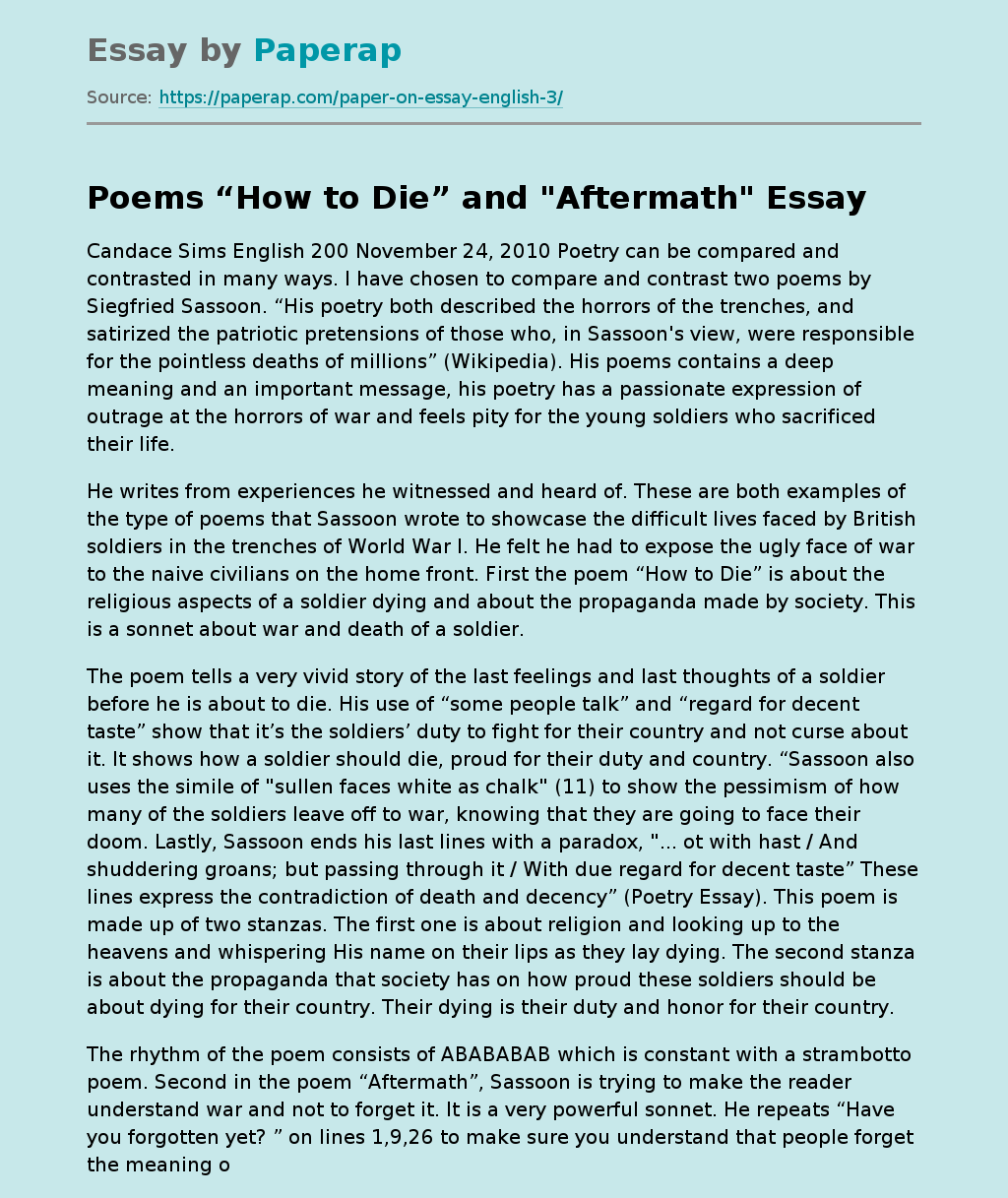Candace Sims English 200 November 24, 2010 Poetry can be compared and contrasted in many ways. I have chosen to compare and contrast two poems by Siegfried Sassoon. “His poetry both described the horrors of the trenches, and satirized the patriotic pretensions of those who, in Sassoon’s view, were responsible for the pointless deaths of millions” (Wikipedia). His poems contains a deep meaning and an important message, his poetry has a passionate expression of outrage at the horrors of war and feels pity for the young soldiers who sacrificed their life.
He writes from experiences he witnessed and heard of. These are both examples of the type of poems that Sassoon wrote to showcase the difficult lives faced by British soldiers in the trenches of World War I. He felt he had to expose the ugly face of war to the naive civilians on the home front. First the poem “How to Die” is about the religious aspects of a soldier dying and about the propaganda made by society.
This is a sonnet about war and death of a soldier. The poem tells a very vivid story of the last feelings and last thoughts of a soldier before he is about to die.
His use of “some people talk” and “regard for decent taste” show that it’s the soldiers’ duty to fight for their country and not curse about it. It shows how a soldier should die, proud for their duty and country. “Sassoon also uses the simile of “sullen faces white as chalk” to show the pessimism of how many of the soldiers leave off to war, knowing that they are going to face their doom.
Lastly, Sassoon ends his last lines with a paradox, “… ot with hast / And shuddering groans; but passing through it / With due regard for decent taste” These lines express the contradiction of death and decency”. This poem is made up of two stanzas. The first one is about religion and looking up to the heavens and whispering His name on their lips as they lay dying. The second stanza is about the propaganda that society has on how proud these soldiers should be about dying for their country.
Their dying is their duty and honor for their country. The rhythm of the poem consists of ABABABAB which is constant with a strambotto poem. Second in the poem “Aftermath”, Sassoon is trying to make the reader understand war and not to forget it. It is a very powerful sonnet. He repeats “Have you forgotten yet? ” on lines 1,9,26 to make sure you understand that people forget the meaning of war. He uses this as a rhetorical sentence because he knows you will forget the meaning of the wars. In the first stanza he talks about the start of the war and how everything is very fresh in your mind.
The second stanza is about the war itself and the death and tasks that came with it. The third stanza is the aftermath of the war, the death, and the anger he felt by all the death he saw. The rhythm of this poem consists of AABBCC and this shows consistent rhyme scheme. The content on both poems is the war itself and how he dealt with it. He didn’t want people to look at war as a duty and an honor, he wanted people to remember that people have died and continue to die for their country. He is a very vivid writer for his time and used descriptions’ that were frowned down on.
The feelings in both of these poems are that of shock and hopelessness in regards to the war not being over. The use of similes and metaphors were used in both poems. He uses visual image to describe to the readers the affects of war. There is a lot of symbolizes throughout both poems. Perhaps soldiers are attracted to war in the same way–they are tempted by the false promise of glory and honor for their country–but unknowingly march toward their own deaths as well(Repression). Sources
Poems “How to Die” and "Aftermath". (2019, Jun 20). Retrieved from https://paperap.com/paper-on-essay-english-3/

